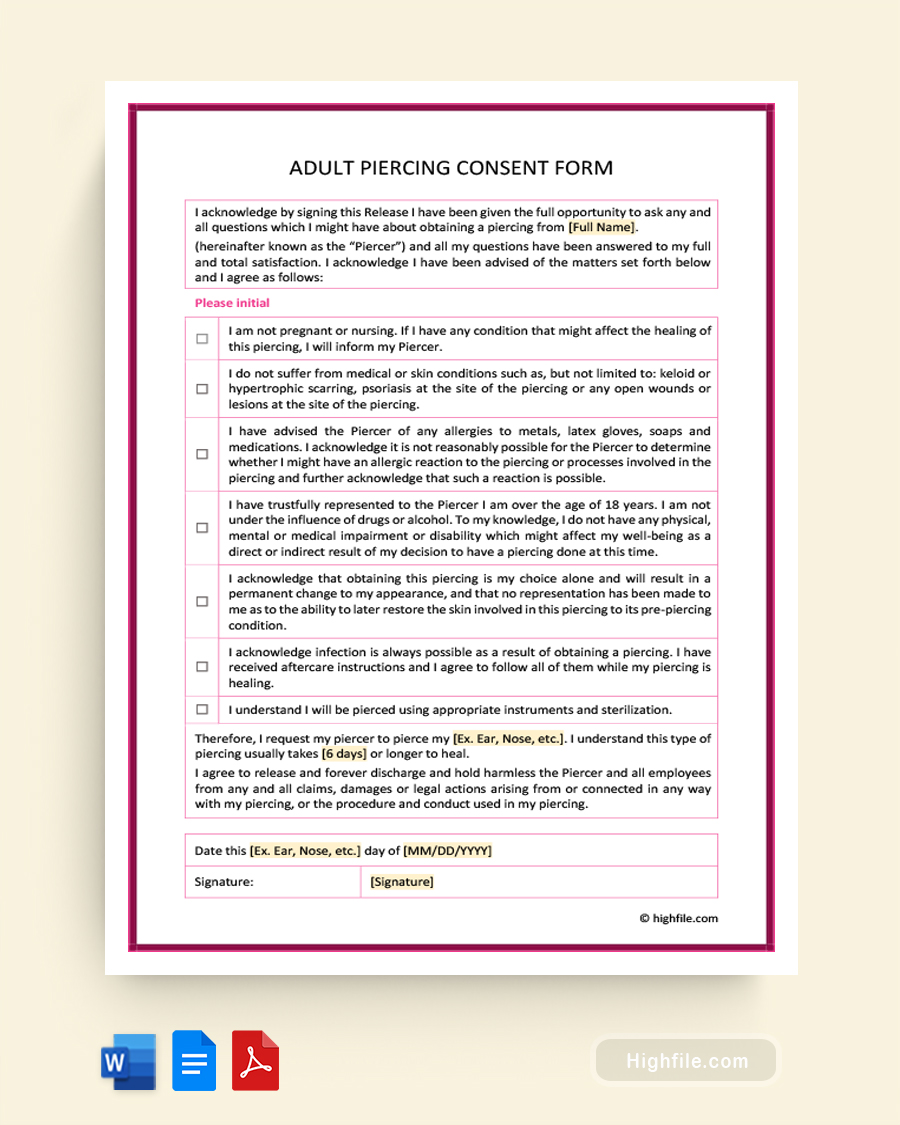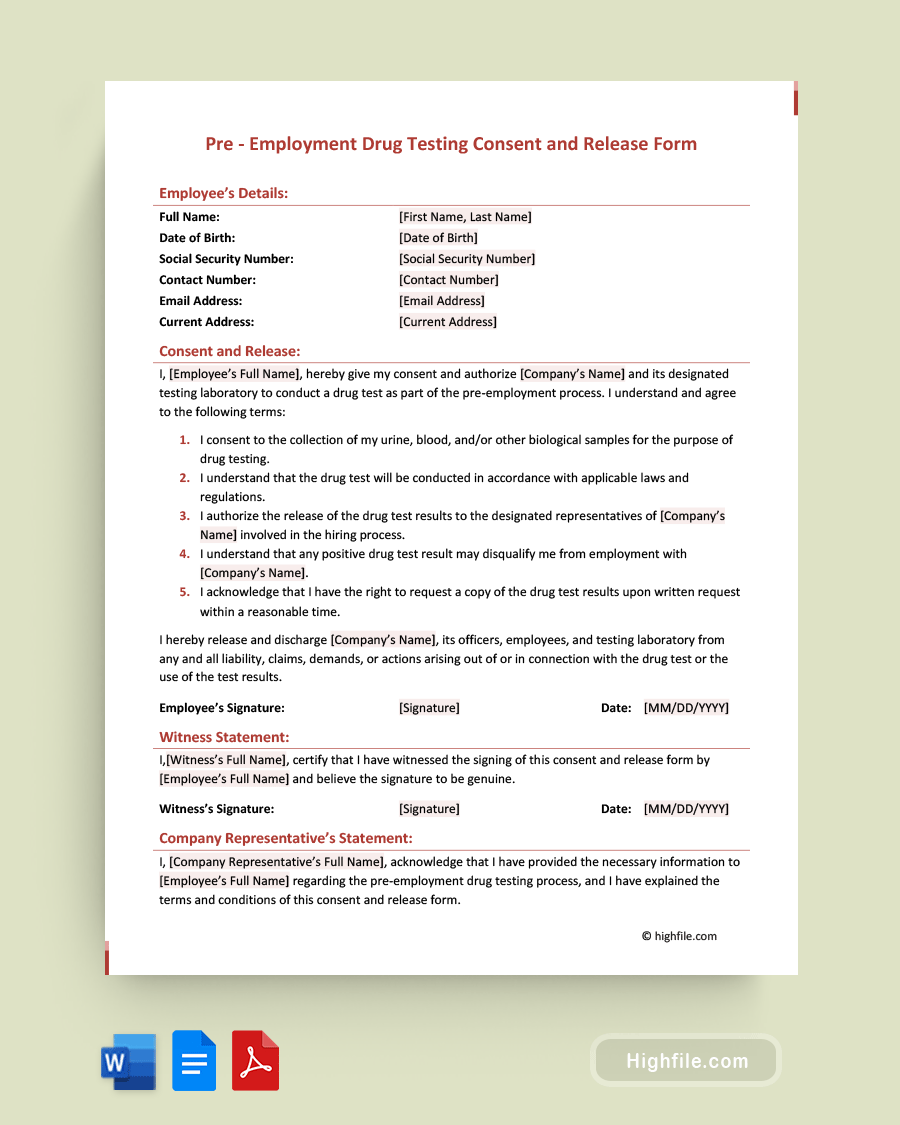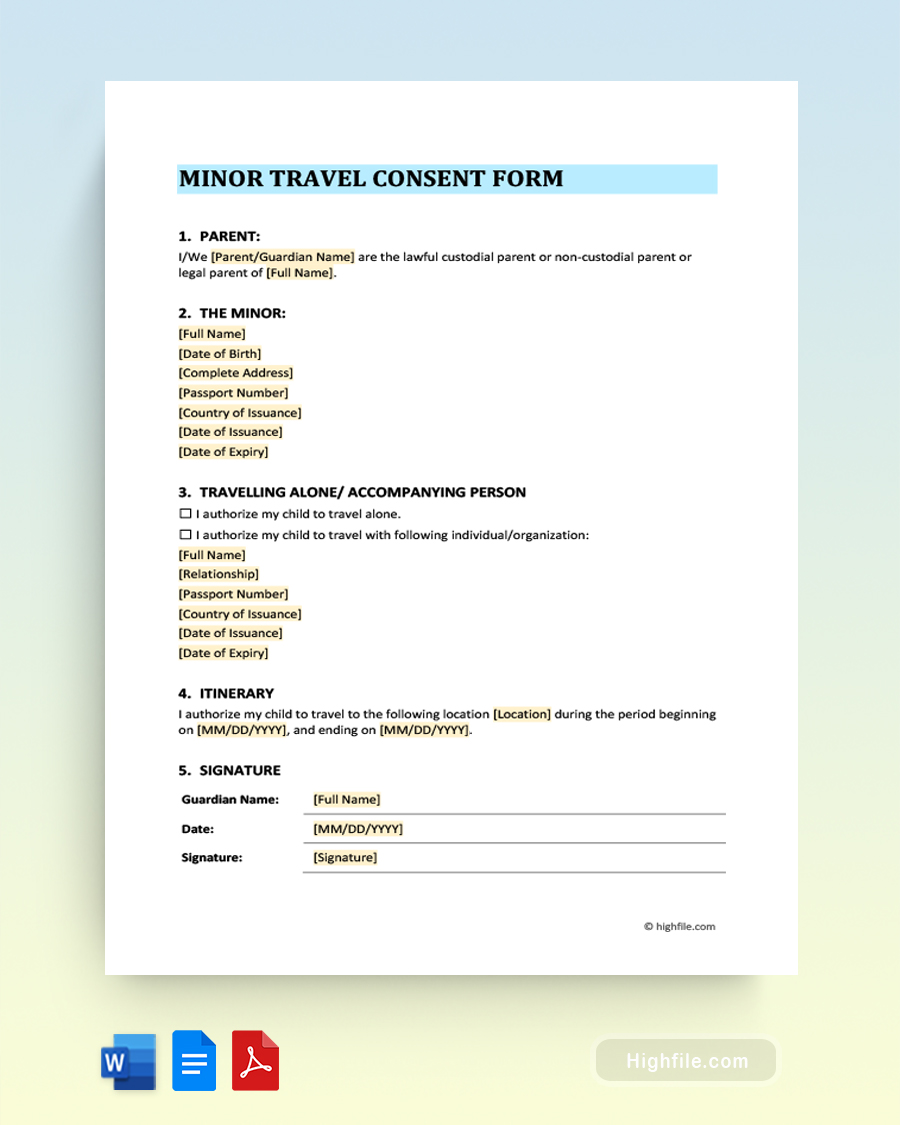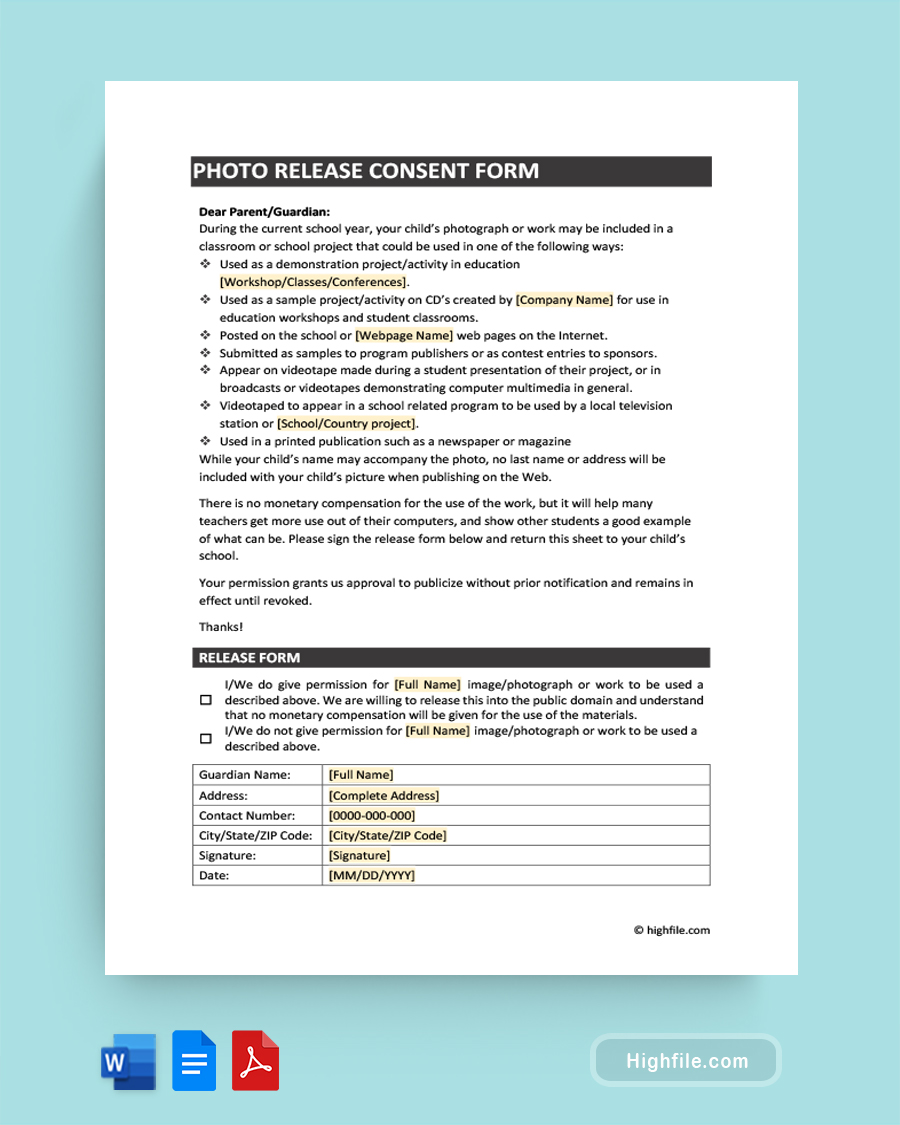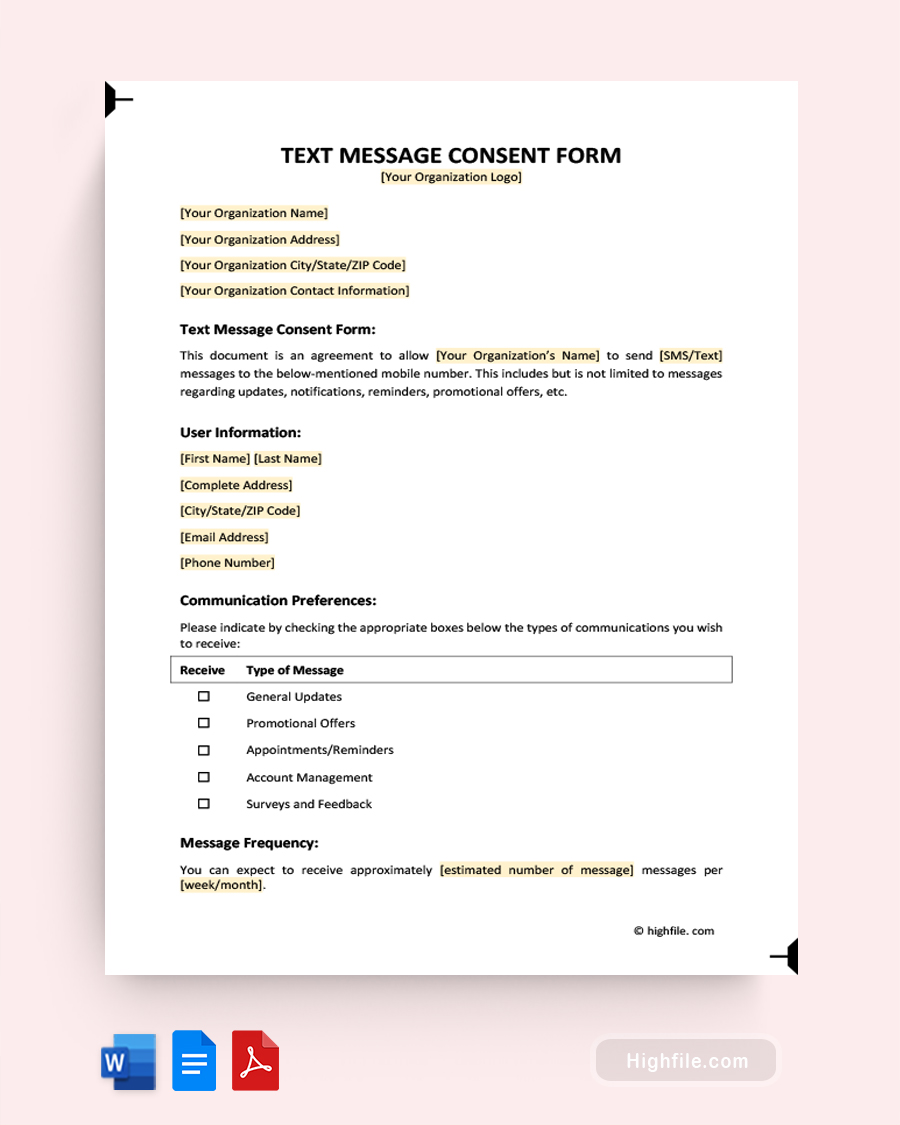Receiving body piercings and tattoos are not for the faint of heart since there is some pain involved in the initial procedure; however, with proper aftercare, piercings heal properly, and clients are satisfied with the result. There are situations where the body piercing does not turn out the way the client was hoping, and they may consider making a claim against the artist or the saloon where they received the body piercing. Many saloons and body piercing artists ask their clients to sign a piercing consent form to educate them and also protect the saloon from lawsuits and complaints.
This post will explore information about body piercing consent forms, why they are needed, and the essential elements of the form used by many artists. There is also a frequently asked question section to further assist readers with this important topic.
What is the Piercing Consent Form?
A piercing consent form identifies the risks associated with receiving a piercing and the aftercare required while the piercing is healing. Once the client has read and understood the risks and aftercare requirements, the client signs and dates the form acknowledging the risks and absolving the piercing artist from any legal or financial liability. The piercing consent form does not absolve the piercing artist or the salon from any negligence experienced by the client.
The piercing consent form is also used whenever minors under the age of 18 in many states are receiving piercings. The consent form must be signed by a parent or legal guardian before the minor child receives a piercing. Depending on the state, ear lobe piercings are allowed without the need for the consent of a parent or guardian. In Hawaii, there are no current piercing laws in place.
Piercing Consent Forms
[wpdm_tag id=”01 consent 2023″ order=”asc” toolbar=”0″ items_per_page=”30″ template=”template” cols=2]
Why is Piercing Consent Form Important?
A piercing and tattoo shop is in business to make a profit and provide innovative, interesting designs to its clients. Unfortunately, clients are not satisfied from time to time and may attempt to recover damages from the salon or the piercer. A piercing consent form provides legal and financial protection from frivolous lawsuits and claims from their clients.
Piercing consent forms are important for several reasons:
- They educate and inform the client
- The client agrees to follow aftercare instructions
- The piercer is following local-state laws
- The piercer and salon are protected from legal and financial liability
- The piercer and salon are not protected from negligence even though a piercing consent form was signed
- Parents and guardians have to consent to minors receiving a piercing other than ear lobes in many states.
- The client identifies any medical condition that could jeopardize their health or cause infections or harm to their person, e.g., pregnancy, skin conditions, allergies
- The client indicates they are over the age of 18 and not under the influence of drugs or alcohol, removing liability from the piercer
Essential Elements of a Piercing Consent Form
Piercing consent forms fall into two categories and can be quite simple and straightforward or more detailed to provide information and education to the client. The two main types of piercing consent forms are:
- Adult piercing consent form
- Child or minor piercing consent form – parent or guardian must provide consent and be present during the procedure; in many states
A simple piercing consent form has the following elements:
- Full address of the client
- Full name and address of the salon
- Identification of the location of the piercing
- Minor’s age and proof of parental or guardianship, if applicable
- Signature and date
- Witness signature or Notarization of the consent form if required by state laws
Piercing consent forms can also provide additional information and confirm the client’s health and allergies. These are more detailed and require the client to initial several phrases on the form indicating they have read, understood, and are willing to proceed. Note: based on the answers to the detailed statements on the form, the piercer may decide not to offer piercing service to the client. E.g., if they have severe skin allergies for example.
In addition to the above essential elements identified in the simple form, a thorough form may include statements that cover the following issues, and clients are requested to initial each. The following are summaries of the areas a piercing salon may cover:
- The client has had an opportunity to ask all questions, which have been answered to their satisfaction
- Confirmation the client is not pregnant
- Confirmation that there or no medical or skin conditions that could complicate healing from a piercing
- The client has advised the piercer of any allergies to metal, latex gloves, medications, and/or soaps
- Confirmation the client is over 18 years of age
- Confirmation the client is not being influenced by drugs or alcohol
- Understanding by the client that a piercing creates a permeant change to the person’s skin and could also cause scarring.
- Understanding that infection is possible and that the client must follow instructions regarding proper aftercare.
- Understanding that all instruments have been cleaned and sterilized
- Government identification with a picture, such as a driver’s license
FAQs
The following are several of the common frequently asked questions many readers have about body piercings.
In many states, minors, including those who are 16, can only get a piercing with their parent or guardian’s approval. The legal requirements depend on the state, and piercing and tattoo salons will be well aware of the legal requirements in their state. If you are underage and planning to get a piercing, check with the salon first and make arrangements to obtain the proper consent for the procedure. The following is an indication of how the laws vary:
ᐅ Some states have no legal requirement for consent
ᐅ Ear piercings are allowed without consent in some states
ᐅ Piercings to the genitals or nipple are not allowed in some states
ᐅ Parental or guardian consent is required in most states
ᐅ Parent or guardian must be present while the piercing is taking place
ᐅ Some states require either a witness to the signature of the parent or guardian, or the form must be notarized before services can be performed.
Similar to the previous answer, it depends on the state regarding whether a 14-year-old can have their ears pierced. For example, in California, a minor’s ears can be pierced without parental consent; however, in Colorado, any piercing, including the ears, must have parental or guardian consent. In Arizona, consent is not needed; however, the parent or guardian must be present during the procedure.
Check the requirements in your local state with a salon or piercing artist to confirm whether consent is required.
In most states, ear piercings are allowed; some states require consent, while others do not require consent for ear piercings. The majority of states require parental or guardian consent for a minor at the age of 13 or 14 to receive a piercing of any kind. However, there are states, such as Mississippi, that do not allow piercings of any kind, while Iowa currently does not have any regulations in place concerning piercings.
Check with the salon for the requirements in your state regarding what piercings are allowed for minors and what type of consent is needed.
Key Points
Piercing consent forms are important for both the client and the piercer or salon. The piercer is protected from frivolous claims once the client signs the consent form. A good consent form also collects information about the client and educates the client at the same time regarding the risks of piercing and also regarding potential health complications.
Clients requesting body piercings should be aware of potential health issues such as allergies to the soap, cleansing agents, tape, and infections, particularly if aftercare instructions are not followed properly. However, even with a piercing consent form, the salon and piercer are not protected from negligence while the patient is in their care.
Scars left by piercings are permanent. Clients can remove pins, rings, earrings, etc.; however, there will be a small scar remaining even after the hole has healed over. This may be an issue for some clients who obtain a piercing and then have second thoughts afterward.
Piercing rules and laws for minors vary by state, and clients who are minors considering a body piercing of some kind should check first with the salon to find out what the laws are in the state where they reside. Many states allow ear piercings without the need for a parent or guardian to sign the consent form. However, many of these states require the presence of the parent or guardian while the minor is having the procedure.
Several states do not allow any piercings at all if the client is a minor. Others require the consent form to be signed by the parent or guardian and then notarized by a notary public.
Check with your local salon for the guidelines and laws where you live. Regardless of where you live, piercing consent forms are helpful for the client, the piercer, and the salon providing these services to adults and minors.
